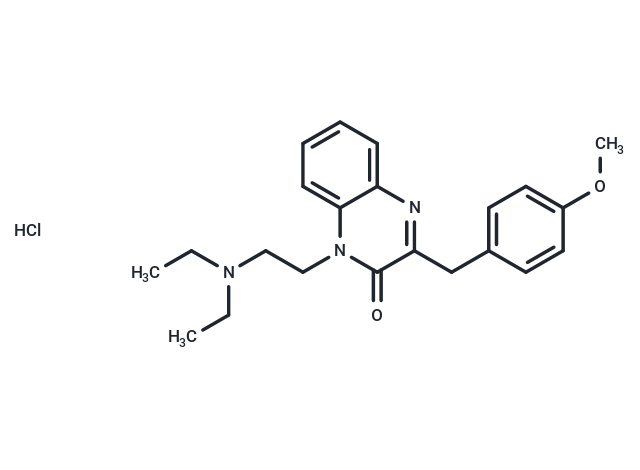Shopping Cart
- Remove All
 Your shopping cart is currently empty
Your shopping cart is currently empty

Caroverine hydrochloride (Caroverine HCL) is a potent, competitive and reversible antagonist of NMDA and AMPA glutamate receptor. It is also an antioxidant and calcium-blocking agent that exhibits vasorelaxant action, and can be used for the research of inner ear tinnitus.

| Pack Size | Price | Availability | Quantity |
|---|---|---|---|
| 5 mg | $39 | In Stock | |
| 10 mg | $64 | In Stock | |
| 25 mg | $133 | In Stock | |
| 50 mg | $228 | In Stock | |
| 100 mg | $397 | In Stock | |
| 200 mg | $582 | In Stock | |
| 500 mg | $913 | In Stock | |
| 1 mL x 10 mM (in DMSO) | $43 | In Stock |
| Description | Caroverine hydrochloride (Caroverine HCL) is a potent, competitive and reversible antagonist of NMDA and AMPA glutamate receptor. It is also an antioxidant and calcium-blocking agent that exhibits vasorelaxant action, and can be used for the research of inner ear tinnitus. |
| In vivo | Caroverine (1 μM; pretreated for 10 min) inhibits the pressor response to KCl (80 mM) and noradrenaline (1 μM) in the rat hindquarter preparation. Caroverine markedly suppresses the contraction caused by KCl (40 mM) in the rat isolated aorta[1].Caroverine (1.44 mg/rat; s.c; 1.0 mL/h for 72 h) attenuates impulse noise-induced hearing loss in the rat[2] |
| Alias | Caroverine HCL |
| Molecular Weight | 401.9 |
| Formula | C22H28ClN3O2 |
| Cas No. | 55750-05-5 |
| Smiles | Cl.CCN(CC)CCn1c2ccccc2nc(Cc2ccc(OC)cc2)c1=O |
| Relative Density. | 1.11g/cm3 |
| Storage | Powder: -20°C for 3 years | In solvent: -80°C for 1 year | Shipping with blue ice. | |||||||||||||||||||||||||||||||||||
| Solubility Information | DMSO: 100 mg/mL (248.80 mM), Sonication is recommended. | |||||||||||||||||||||||||||||||||||
Solution Preparation Table | ||||||||||||||||||||||||||||||||||||
DMSO
| ||||||||||||||||||||||||||||||||||||

Copyright © 2015-2025 TargetMol Chemicals Inc. All Rights Reserved.